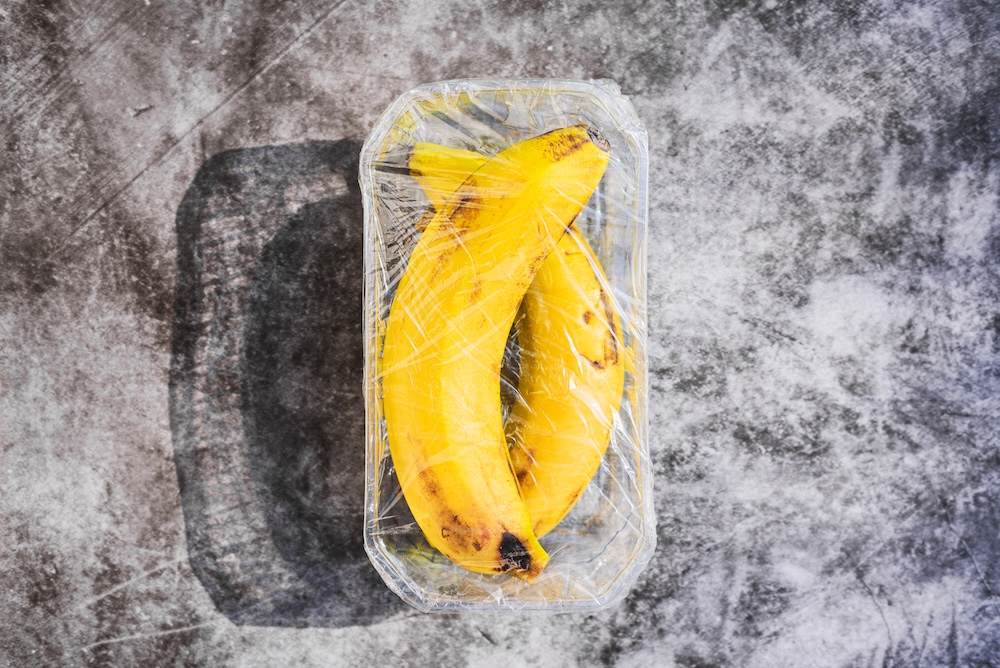Plastic was once hailed as a miracle material. Today, it’s everywhere — and in many cases, absurdly unnecessary. These are some of the stupidest ways our disposable culture relies on plastic, revealing just how far we’ve drifted from common sense.
1. Plastic-Wrapped Bananas
Nature already gave bananas a biodegradable, protective peel. Yet supermarkets wrap them in cling film or plastic trays.
Globally, over 60% of fruits and vegetables in large supermarket chains are packaged in plastic (Ellen MacArthur Foundation). That packaging is often used for less than 24 hours but lasts centuries.
2. Single-Use Cutlery and Plates
Knives and forks designed to last minutes — then persist for centuries.
Every year, the world throws away an estimated 40 billion single-use plastic utensils (UNEP). Many of them end up in waterways, contributing to the 8–11 million metric tons of plastic that leak into oceans annually.
3. Tiny Plastic Bottles of Water
Half-sized bottles for convenience, often sold in bulk packs wrapped in even more plastic.
In the U.S. alone, 50 billion plastic water bottles are used annually. That’s about 13 bottles per month for every American (Container Recycling Institute). And half-sized “mini” bottles double the packaging-to-water ratio — more plastic for less actual product.
4. Plastic Straws for Drinks With Lids
Many takeout drinks already come with a sip-friendly lid. Adding a straw isn’t just redundant — it’s symbolic of a culture addicted to excess.
Globally, people use an estimated 500 million plastic straws per day (Ocean Conservancy). In the U.S., that’s enough to circle the Earth more than twice every day.
5. Individually Wrapped Vegetables
Cucumbers, carrots, even bell peppers — each shrink-wrapped as if they couldn’t survive a grocery trip without armor.
The UK alone sells over 1.2 billion plastic-wrapped cucumbers each year (WRAP). Plastic film adds days to shelf life but creates waste that recycling systems reject.
6. Disposable Plastic Coffee Pods
Billions of tiny plastic pods, used once, then trashed.
Globally, consumers use more than 39 billion single-use coffee pods annually (Statista, 2022). That’s enough pods to circle the planet more than 100 times if lined up. Only a fraction are recycled.
7. Single-Use Plastic Shopping Bags
Carried for less than 15 minutes, they end up in landfills, oceans, or animal stomachs for hundreds of years.
Worldwide, people use 1 to 5 trillion plastic bags every year (UNEP). That’s nearly 10 million bags every minute.
8. Plastic Confetti and Glitter
Throwaway “joy” made of microplastics. Scattered into parks, streets, and oceans — impossible to clean, guaranteed to pollute.
The EU banned microplastic glitter in 2023 after studies found that over 35% of ocean microplastics originate from synthetic particles like glitter and microbeads (European Chemicals Agency). What seems festive leaves behind invisible pollution for decades.
9. Hotel Toiletry Minis
Tiny bottles of shampoo and lotion used once or twice before being tossed.
The hospitality industry uses 150 billion single-use plastic bottles annually, many of them toiletry minis (International Tourism Partnership). Some hotel chains are moving toward refillable dispensers, but the majority still rely on throwaway packaging.
10. Plastic Packaging for Plastic Items
Plastic forks wrapped in plastic. Plastic toys sealed in layers of molded plastic. A matryoshka doll of disposability, proving how absurd the cycle has become.
In 2019, global packaging waste reached 141 million metric tons — with plastic packaging accounting for nearly 40% of all plastic produced worldwide (OECD). Much of it is “double packaging,” plastic wrapped in plastic.
The Bigger Picture
These examples might sound funny, but they reflect a deeper problem: a culture so programmed for convenience that we ignore absurdity. We wrap what’s already wrapped, package what doesn’t need packaging, and accept waste as normal.
Every one of these stupid plastic uses is a symbol. They show how disposability has infiltrated not just our markets, but our minds.
Don’t We Deserve Better?
We don’t need bananas in plastic trays. We don’t need forks that outlive empires. We don’t need single-use pods, glitter, or layers of pointless packaging.
Don’t we deserve systems designed for durability, fairness, and dignity instead of stupidity and waste? Refusing these absurd uses isn’t just about saving the planet. It’s about reclaiming common sense.
Final Thoughts
Plastic has its uses. But so much of what surrounds us is not innovation — it’s insanity. The stupidest plastic items remind us how broken the system is. They also remind us that change is possible, because every one of them can be refused, redesigned, or eliminated.
The next time you see bananas wrapped in plastic or a hotel mini shampoo, don’t just laugh at the stupidity. Recognize it for what it is: proof that disposable culture has gone too far. And proof that we need to end it.








